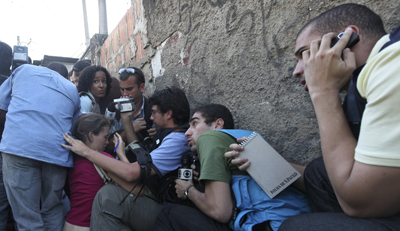There are many complex reasons why Brazil has become a dangerous place to practice journalism. I will cite two possible explanations for the increase in deaths of journalists in the country, where seven journalists have been confirmed killed for the work over the past two years. First, the press is producing more investigative reports on government and police corruption, the misdeeds of politicians, organized crime, and human rights violations. Journalists are killed in reprisal for this type of reporting. The second explanation has to do with impunity. The lack of thorough investigations for these crimes has created a feeling amongst the perpetrators that they will not be identified or punished.
CPJ Special Report
• Journalist deaths
spike in 2012
In Brazil, only one in 10 homicides is solved. This low rate is reflected in the impunity for crimes against journalists. In general, the police make more effort to solve crimes that receive a lot of media attention, and crimes against journalists are not always highlighted in the press. The media professionals who are most exposed are those who take up political causes or are linked to local authorities. Journalists who work in smaller cities, especially near the border areas, are more vulnerable. However, working in larger cities or bigger news outlets does not guarantee immunity from attacks.
In Brazil there is no widespread belief that journalists are human rights defenders, and therefore there are no mechanisms to protect them in the case of threats or risk. In some cases, journalists may use the Program to Protect Human Rights Defenders, which is run by the Brazilian government. But this program is restricted to only eight of the 26 states. Both a budget and a legal framework are lacking.
It is not only journalists–judges are also being killed in Brazil. Today there are 182 judges in the country who have been threatened with death by criminal gangs, according to the National Council of Justice. Violence against magistrates makes journalists feel particularly unsafe, since, a priori, the former have better protection mechanisms and yet still face violence because of their work.
Judges and journalists together represent two of the most important counterbalances for a democratic society. Thus, the threats are clearly intended to intimidate and prevent at any cost the pursuit of justice, the investigation of crimes, and the publication of matters of public interest. In general, the mastermind behind these crimes has political or economic power, or is part of a criminal organization. Brazil ranks 11th worst on CPJ’s Impunity Index, which calculates the number of unsolved journalist murders as a percentage of each country’s population.
Journalist murders are the most obvious violation of press freedom, but the Brazilian press also faces a growing number of cases of judicial censorship via lawsuits filed during election periods, and thus a phenomenon that occurs every two years in Brazil. Several judgments have censored blogs, newspapers, and magazines by forbidding them to publish stories about certain subjects. Press freedom in Brazil is under threat on several fronts.
